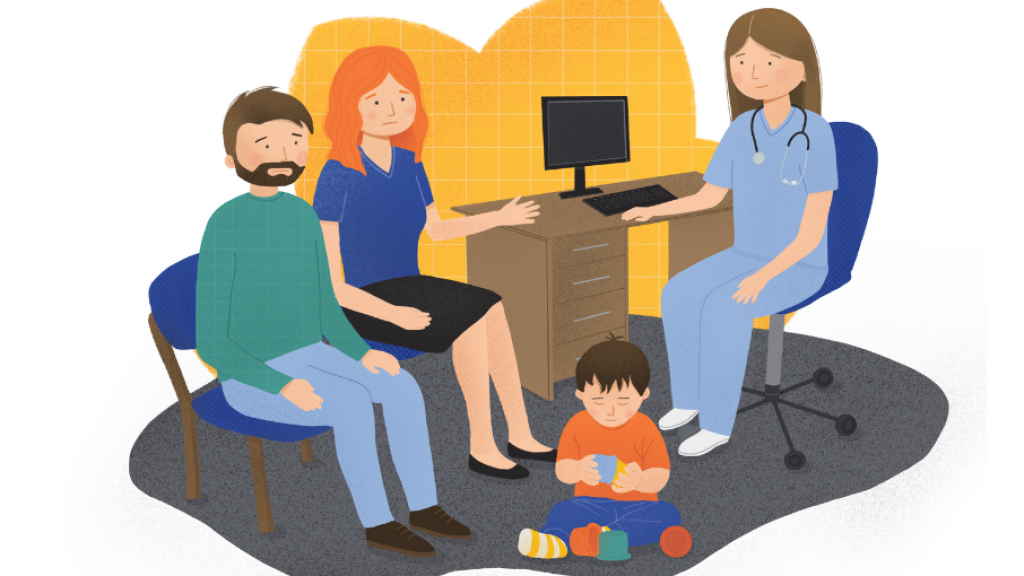
What happens after diagnosis?
Information about what happens after diagnosis and where to get support.
Being admitted to hospital
CHI, Crumlin is the national childhood and young adolescent cancer treatment centre. Every child and adolescent who develops cancer has their diagnosis established/confirmed, and treatment planned, in CHI, Crumlin.
Shared care
Shared care is an arrangement between Children’s Health Ireland at Crumlin and 16 hospitals around the country. Shared care means some of your child’s care can be given at a designated centre in your local area. For example, looking after central lines, some chemotherapy, blood tests, transfusions and treatment for side-effects. This can help you and your family to avoid some of the travelling to Dublin and let your child be at home as much as possible.
Your shared care centre will have information about your child’s diagnosis and treatment plan and they will follow the ‘Supportive Care Guidelines’, which are detailed guidelines used in CHI at Crumlin.
For most children living within the Dublin catchment area (Co. Dublin, Co. Kildare, Co. Wicklow), Crumlin Haematology & Oncology Department provides all the care for the patient. Depending on location within these counties some children will attend Drogheda, Portlaoise and Mullingar for shared care.
Meeting with the healthcare team
A team of healthcare professionals (multi-disciplinary team (MDT)) will talk to you about your child’s treatment plan. Another word for the treatment plan is a protocol.
The MDT meeting is a good time to ask any questions. Of course you may be feeling overwhelmed trying to cope with the news of the diagnosis and a lot of medical information. If you have questions after the meeting, don’t be afraid to ask the doctors and nurses. You can also call our Support Line and ask to speak to our children’s cancer nurse.
Questions you might like to ask
- What stage is the cancer at? What does this mean?
- What treatment choices are there?
- Does my child need more than one type of treatment?
- Is this the best treatment for my child? Why do you think so?
- How long will treatment last?
- Will my child be cured and recover?
- What are the chances of the treatment working?
- How and when will we know if the treatment has been a success?
- What side-effects can my child expect in the short term?
- Are there any long-term side-effects?
- Will treatment affect my child’s fertility in the long run?
Treatment plan
Each child’s treatment plan is unique to them, but will be based on “standard of care”. This is based on all the scientific evidence from children’s cancer hospitals all over the world about what types of treatment work best for a particular cancer. Read more about treatments for children’s cancers.
Clinical trials
A clinical trial is a medical research study to find out the most effective treatment for a particular disease. If there is a clinical trial that your MDT thinks might benefit your child, they will explain this to you. A clinical trial means your child gets a new treatment or existing treatments given in new ways. Your child does not have to take part. If you don’t want your child to be part of a clinical trial (or if they decide not to themselves, if they are older), they will receive the best known and proven treatment. We have more information on clinical trials.
Giving consent for treatment
Before treatment, you should be fully informed about:
- What the treatment is for
- The type and amount of treatment your child will have
- The benefits and risks of the treatment
- Possible side-effects from treatment
- Any other treatments that may be available
If you are confused about the information or if you have any worries about the treatment let your doctor or nurse know straight away. You will be asked to sign a consent form saying that you understand what the treatment is for and that you give permission for treatment to be given. Once a child reaches the age of 16, they can usually consent to their own treatment.
Going home after diagnosis and starting treatment
This can be very daunting for you as a parent or guardian. The hospital team will be there to support you and will organise the supports and services you will need at home. Our life during treatment page has some information and tips to help you adjust and cope better.

Coping with your child’s diagnosis
Although many children with cancer can be cured, it is still devastating to hear that your child has cancer. Both you and your child will have many different feelings and emotions.
When a child is diagnosed with cancer, it has a big impact on all the family. Your child’s routine is likely to change. They may have to stay in hospital for treatment and are likely to have regular hospital appointments. This can be overwhelming for you, your child and the rest of the family. But there are many healthcare professionals and support organisations that can help you through this difficult time. We have more information on coping with a cancer diagnosis.




